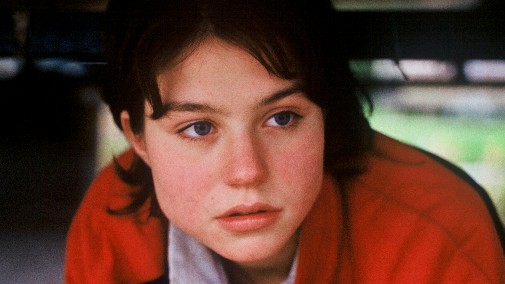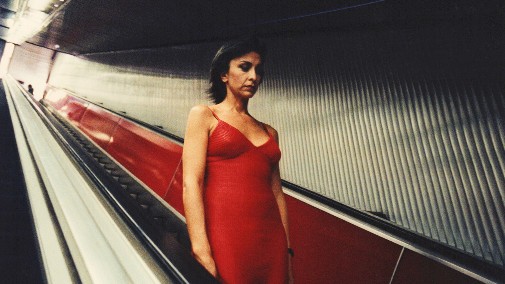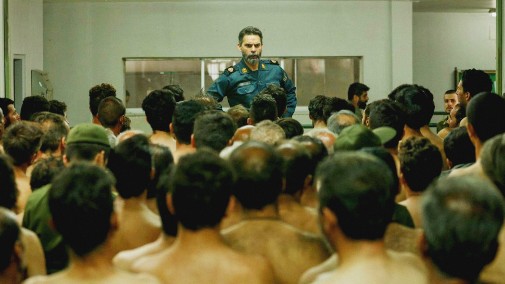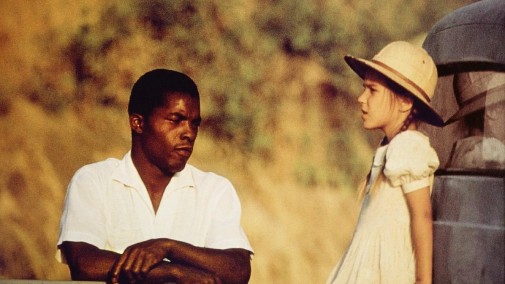Cannes at Home: Days 8 & 9 – Women in Red, the War on Drugs & French Colonialism
 Saturday, May 28, 2022 at 12:14AM
Saturday, May 28, 2022 at 12:14AM The 75th Cannes Film Festival is almost over! If there's any hope of finishing Cannes at Home before the closing ceremony, it's critical to pick up speed. So, here go two days' worth of auteurs in one go.
The Dardennes showed their latest, Tori and Lokita, to some acclaim. However, after The Unknown Girl and Young Ahmed, I'm skeptical about the Belgian duo's tackling of immigrant stories. Mario Martone also returned to the competition, and his Nostalgia could see Perfrancesco Favino winning the festival's Best Actor trophy. In contrast, Saeed Roustayi is competing for the Palme for the first time with Leila's Brothers. All that being said, the big story from these latest festival days was surely Claire Denis' Stars at Noon. Most critics seem to hate it – some even jokingly calling for the director's retirement – while a scattering of ardent fans provides a contrarian takes. For sure, hers seems to be the most divisive film at the Croisette.
Today's Cannes at Home selection includes the Dardennes' first Palme d'Or honoree Rosetta, Martone's L'Amore Molesto, Roustayi's acclaimed Just 6.5, and Denis' debut feature Chocolat…

ROSETTA (1999)
Speaking strictly on the number of filmmakers that tried to imitate them, the Dardennes are probably the most influential artists in this Cannes at Home miniseries, give or take David Cronenberg. In the 1990s, when the Belgian duo transitioned from non-fiction to fiction film, the brothers solidified a cinematic approach that privileged documentary-like techniques to shoot social realist narratives. From the gritty tremulousness of the hand-held camera to chasing movements that present the frame as an intrusive gesture, their approach centers on the illusion of anti-artificial observation.
Less limiting than the Dogme 95 movement, their cinema thus provided a blueprint for on-screen European realism for the next two decades. Indeed, we're still seeing its effects today, far beyond the Dardennes' filmography. Check out any film festival with a Euro-centric selection if you're in doubt. I'm no fan of this phenomenon and often find myself resenting the brothers, implicitly blaming them for popularizing this shorthand of illusory reality. However, that's unfair and can result in the underappreciation of some fine films. Such titles as Rosetta, their big breakthrough and winner of the 52nd Cannes Film Festival, deserve nothing but applause.
From a vertiginous introduction to its last ragged minutes, the story of a young woman facing the perils of economic despair in contemporary Liège is an unflinching expose doubling as a plea for empathy. Clad in brilliant red, Émilie Dequenne plays Rosetta as an open wound, vulnerable and tender, her costume painting a smear of blood across the screen. Hers is a feverish tour de force, perfectly calibrated with the camerawork, editing patterns, and immersive sound design, to the point it all feels like a plunge into the protagonist's fraught psyche. It's sobering stuff, an exercise that manages to hold back from miserabilist melodrama, presenting lucid political arguments in the form of a character study.
You can find Rosetta on the Criterion Channel.

L'AMORE MOLESTO (1995)
Mario Martone's adaptation of Elena Ferrante's first novel is known by many different names outside Italy. Whether you call it Troubling or Nasty Love, maybe Victim and Executioner if you're in Portugal, the film's an unjustly forgotten gem that begs rediscovery. Selected for the Main Competition at the 48th Cannes Film Festival, it represented the only time Martone had ever competed for the Palme d'Or until this year. Had it won some well-earned recognition back then, maybe he'd have been back sooner. Anyway, there's no use crying over spilled milk. What one must do is acknowledge the slippery greatness of L'Amore Molesto.
Centered on a middle-aged woman trying to uncover the mystery of her mother's death, the narrative unravels across Naples in a tapestry where past and present are interwoven. Going in and out of memory, the protagonist comes to understand the matriarch through a different lens. Seeing through her eyes, we witness a reevaluation of childhood remembrance and a growing awareness of how moralistic social pressures can shape the lives of women, trauma as the chisel by which one's soul is forcibly sculpted. And then, at the moment when absolute certainty is in reach, the film holds back.
Keeping us in elliptical reticence, L'Amore Molesto allows its characters to live beyond our grasp. Some might see dramatic cowardice in Martone's choices, but I value his rigor and respect. Even as it evades fixed conclusions, the film is an evocative wonder, intoxicated by the Neapolitan environment and ever so slightly tipsy on the promise of female pleasure. Dancing on the edge of perversity, the story offers a cornucopia of insinuations, witty suggestions, and lewd imaginations. In the lead role, Anna Bonaiuto articulates her film's haunting properties while delivering a grounded characterization in shades of vermillion.
L'Amore Molesto is streaming on the Roku Channel, VUDU, Tubi, Kanopy, Film Movement Plus, and Freevee. It's also rentable on many platforms.

JUST 6.5 (2019)
Cramming what feels like a TV season's worth of story, or maybe a novel's sprawling tale, into a lean and mean 131 minutes is no easy feat. And yet, Saeed Roustayi's Just 6.5 never feels effortful, going by with fluid fleetness while it alternates subjectivities, tones, and narrative allegiance. It's a mesmerizing muscular feat, full of surprising depths and political angles that only reveal themselves in the picture's back half. For a while, it might seem like an über-entertaining piece of Iranian copaganda with a healthy dose of self-awareness, an epic episode of the war on drugs where corruption is the price to pay for meaningful change. But then, it transforms into something else altogether, something richer.
Built around two incredible performances by Peyman Moaadi and Navid Mohammadzadeh, Just 6.5's widening canvas depends on a cast of multidimensional personalities whose complexity can't be overhyped. From an Ahab-like obsessive to his criminal white whale, a rogues' gallery of excellent characters populates the cinematic equivalent of a Bruegel landscape, bursting at the seams with life and astute social observation. So propulsive as to be classified as action-adjacent, Just 6.5 differs from the intricate dramas and meta exercises that made Iranian cinema famous overseas. Maybe because of that, it still struggles to find international distribution, no matter its greatness or how accessible it is.
Just 6.5 is currently unavailable for streaming. Let's hope that changes soon, since the movie deserves to be seen.

CHOCOLAT (1988)
"Amidst bronzed black African faces, the white skin color evoked something akin to death."
Claire Denis arrived fully formed in 1988, presenting her debut feature in the Cannes Film Festival Main Competition, to which she'd only return in 2022. Though she'd explore many of its themes more boldly in later works, Chocolat still represents an astounding piece of work, as challenging as it is dazzling. As that quote indicates, Gallic colonialism looms over the film, a destructive force of outdated empires whose inhuman forces have long fascinated Denis. Indeed, Chocolat is a semi-memoirist project, recalling the director's childhood in Africa.
That's not to say she regards the past through rose-colored glasses – quite the contrary. If anything, nostalgia is weaponized as its own self-reflective annihilator, and the dialogue isn't shy about calling out both the absurdities and the cruelties of its white figures. Considering the decade in which it was made and originally released, Chocolat can be read as an unsentimental response to Out of Africa's dreams of genteel European colonizers living love stories across lands for which they claimed illegitimate ownership. Nevertheless, no matter how beautiful the screen may look, one can't ignore an itchy wrongness permeating every frame.
Putting it bluntly, these white people don't belong in these specific spaces. Their presence is forever felt like an invasion, with the camera taking on the implicit perspective of the Black servants who make their idyll possible. Though Denis imagines herself as an avatar called France – not the subtlest choice – Chocolat belongs to Protée, a proto-romantic hero. The very presence of the latter is fetishized by a European eye ready to force a state of perpetual submission upon him. Even silence feels like a violence he must endure. Notice when an amorous interloper ascertains how a Black man can't defend himself from white-washed menace without being punished for the perceived insolence.
Isaach De Bankolé is the glue that holds this experiment together, embodying an alienating expression where human bodies are another formal element. No wonder the director would return to the performer, time and time again. Moreover, though characters speak of social barriers as visible delineations, Denis' camera draws our attention to the invisible forces at hand, using emptiness around actors, absence, voids in the act of negative illustration. Architecture and landscape often reflect the suffocating realities of colonialist rule, like the dark shadows of transparent foes. Chocolat is a disquieting film, a beautiful nightmare that, once upon a time, signaled the arrival of a talent like no other.
Chocolat is streaming on the Criterion Channel.



Reader Comments (4)
Rosetta is a masterpiece and while I think All About My Mother was the better film. Cronenberg made the right choice with Rosetta.
thevoid99 -- Agree to disagree on that last point :P To be honest, I also prefer GHOST DOG and TIME REGAINED as possible Palme d'Or winners instead of ROSETTA. However, Dequenne's victory feels unimpeachable.
As with any awards body, the Cannes jury usually doesn’t strictly vote for whichever they think the best film in competition is, as being on that jury is an opportunity to make a statement with their picks — political, artistic, or otherwise. So while I definitely prefer All About My Mother, I agree with thevoid99 that Cronenberg’s jury made the right call in giving Rosetta the Palme d’Or. Almodóvar was already fairly established at that point, so I applaud the decision to give that boost to the Dardennes instead. It stands as the crucial moment in their career as filmmakers, the one that all of their subsequent success can be traced back to. Almodóvar winning a Palme d’Or should have happened at some point, but it definitely wouldn’t have impacted his future as a filmmaker as much as it affected the Dardennes’. Of course, one could easily make the argument that Cannes has OVER-awarded the Dardennes since then, but that’s another story.
The “statement win” isn’t always something I support (Fahrenheit 9/11’s win frankly has not aged well at all, especially considering the other films in competition that year), but I totally understand why it’s sometimes the right call to have a motive behind awarding a film other than it simply being the “best” (which is obviously highly subjective anyway).
I also remember Stephen Frears outright admitting in an interview back in 2007 when he was heading the jury that the decision not to give any awards to No Country for Old Men was made solely because they all agreed that it wouldn’t need any help finding acclaim or attention. If I were ever on a film festival jury, I have to say I’d take that approach as well and try to cast my vote based on balancing my feelings on what the best films are and which ones would benefit the most from the profile boost.
It's always exciting to read articles from other writers and practice something from their web sites. Alan Grant Jurassic World Jacket